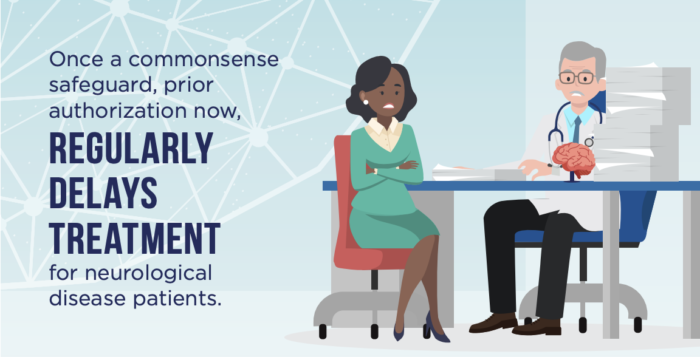Prior Authorization’s Snowball Effect
May 7, 2020
Prior authorization was once a commonsense safeguard. But that is no longer the case. Today, insurers overuse the tactic to benefit their bottom lines, which is problematic for patients with neurological diseases.
And even worse, like a snowball rolling down a hill, the number of tests and treatments that require insurers’ prior approval keeps growing. Initially, this type of utilization management practice was necessary only for patients to access the most expensive medications and tests. But now, even routine diagnostic procedures, like basic imaging, are held up waiting on insurers’ approval. Prior authorization interfere with doctors’ orders.
At a meeting earlier this year, members of the Alliance for Patient Access’ Neurological Disease Working Group agreed that these delays have real consequences.
Getting access to tetrabenazine provides an example. More than a dozen years ago, the Food and Drug Administration approved the medication to treat movement disorders associated with Huntington’s disease. It has been proven safe and effective for regulating uncontrolled muscle movements, but the label requires genetic testing.
“I understand genetic testing is required,” explained Robert Fekete, MD, a movement disorders specialist in New York state. “But insurers’ prior authorization requirement on the testing is adding another barrier.” Patients who cannot complete the testing are limited to a lesser dose of the medication, leaving them to suffer with tics, jerks and loss of coordination.
Patients aren’t the only ones affected by onerous prior authorization, though. The volume of paperwork is contributing to burnout and frustration among neurologists.
“Insurers’ use of prior authorization is not inherently bad,” explains neurologist David Charles, MD, Alliance for Patient Access Chairman. “It becomes bad when insurers use it excessively, forcing patients to wait unnecessarily and bogging physicians down in paperwork.”
“I recently had a patient with severe headache wait over three weeks for authorization from the insurance company for a brain scan. The patient was left to pointlessly suffer this entire time with extreme worry and anxiety about what was causing the headache,” Charles continued.
Prior authorization is far from the only barrier inhibiting patient-centered care in neurology, but it is among the most frustrating to clinicians whose goal is to provide patient-centered care.
Categorized in: Blog


